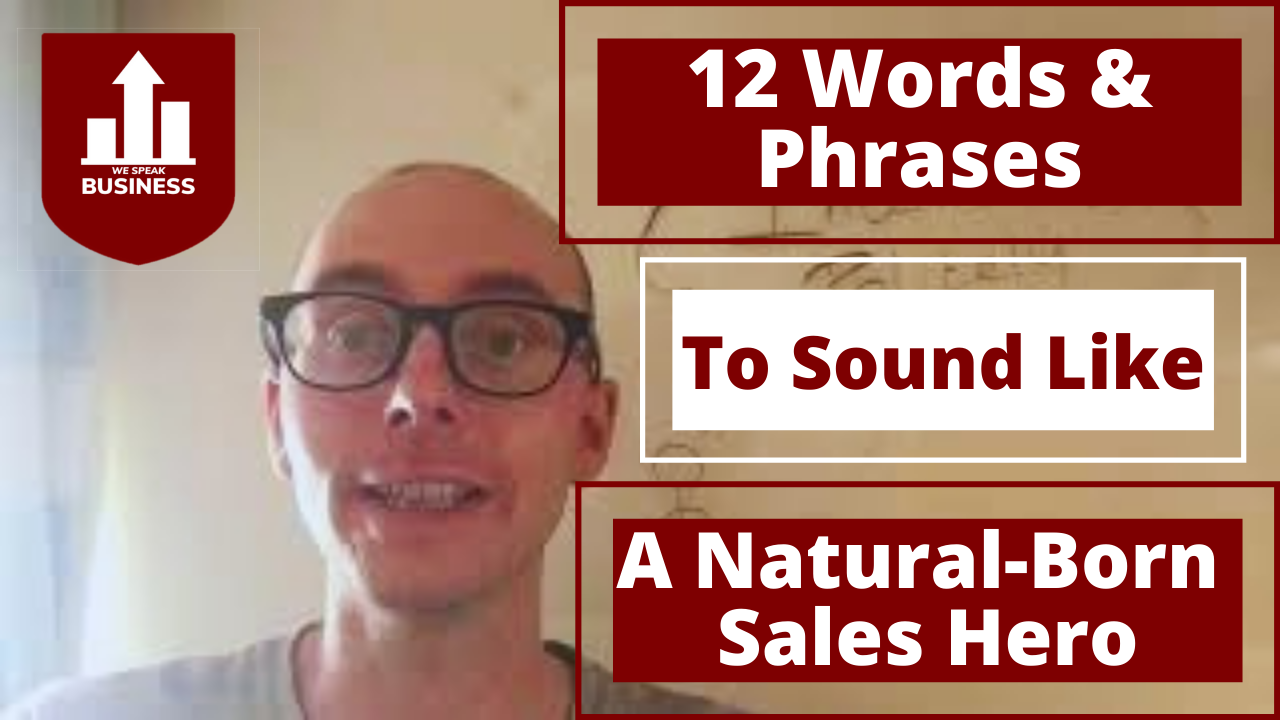12 Words & Phrases To Sound Like A Natural-Born Sales Hero
Jun 27, 2021
Working in sales can be tough. Not only do we have to persuade someone to buy our product or service, but we also have to have a good understanding of a lot of different sales words and phrases.
Native speakers will often use a variety of idioms, phrasal verbs and sometimes slang to communicate their point of view.
So in this blog I’m going to be sharing with you five useful sales words and phrases that you may hear native speakers using during a sales meeting or when pitching a product, and that you can start using yourself to sound more like a professional salesperson.
I’ll also be sharing some additional sales idioms too that will help you sound more natural and fluent.
Let’s dive in with our five words and phrases.
After-sales service - noun
After-sales service is basically a service that continues after a product has been sold. When we sell something, we need to make sure that the customer’s entire buying journey is as comfortable and easy as possible. So we provide something that we call an after-sales service to make sure that this happens.
Some examples of this phrase are as follows:
“Online support is an important part of after-sales service for buyers of software.”
“Customers have reported that after-sales service is just as if not more important than the actual sale itself.”
Buyer - noun
A buyer is any person who buys something. Or it could also be a person employed by a firm to buy materials or other products from another company or supplier. It’s a very common word used in sales. You’ll also often hear the phrase, a ‘first-time buyer’, which means someone who is purchasing something for the very first time.
“Does your bank offer special loans for first-time home buyers?”
“Our buyers are skilled and experienced in getting the best possible deal.”

Prospect - noun
A prospect is a possible or probable customer; a prospective customer. Someone who may or may not buy from us. It is someone who has expressed interest in our products or services but has yet to make a full commitment or purchase.
Prospect is a countable noun so we add ‘s’ to the end of it if we want to use it in the plural.
“Make sure your prospect is someone with the power to make purchasing decisions, or you'll be wasting your time.”
“We’ve had an increase in prospects ever since we launched that new marketing campaign.”
USP - noun
USP is an acronym for ‘Unique Selling Proposition’. This is a feature that makes a product or service stand out from its competitors, such as lowest price, highest quality, best design, etc. Every company out there will have its own USP, and they use this message to differentiate themselves from the competition. How and why they are different and why their customers or prospects should buy from them.
“When selling, be sure to emphasize your product or service's USP.”
“Having a clear USP can really boost sales if the message is right.”
Wholesale - verb
The word wholesale means to sell something in bulk at a lower price, usually to a shop for resale to the public at a higher price.
We also have whole stores too. Ever heard of Costco? That’s a wholesale store! So the word wholesale can also be a noun as well as a verb.
Take a look at some of these examples.
“If you're wholesaling a product, the price you charge should be around half the recommended retail price that retailers will charge.” - (verb)
"If you want to sell large expensive pieces then wholesale is probably not the way to go." - (noun)

What is We Speak Business Program
We Speak Business is an English course with live speaking lessons for English learners who want speaking practice with native speakers, professional teachers, and students from around the world.
You have live speaking lessons where you can join and start speaking business English every day. There's a lesson every day and also, you can review all record lessons. There is a lot of conversation practice for each level of English (A2, B1-B2, C1). There is a calendar of scheduled lessons so you can see when lessons are and at what time you can join and start speaking. 
In We Speak Business program, you have 24/7 support and also you have student chat where you can speak with other students from all around the world. Before you join our program and start speaking business English, we strongly recommend you sign up for our free seminar with Andrew Smith, where you can learn:
- What goals you need to have to get better results
- How to master business English quickly
- What are the strategies that will help you advance to a higher level
- How you can speak business English more fluently and confidently
- Free resources to help you learn business English
- Exclusive resource to improve your speech
Sales Idioms
Sales uses lots of different idioms, so in this next section, we’re going to look at some common and useful sales idioms that you can also use to up your sales game. Try practicing them by writing some example sentences of your own.
Play It By Ear
Coined by musicians who would play a tune by ear – using their sense of sound rather than a fixed sheet to guide the way – this expression is all about process. It means starting with a basic plan or first step and then responding to feedback and modifying the direction as you go.
“How do you want to go forward with this, Mary?”
“I’m not sure … there are so many variables.”
“Why don’t we play it by ear? We can get moving with stage 1, arrange a review meeting and then map out the transition into stage 2.”
Start the Ball Rolling
This idiom is about making that first interaction in order to get the wheels of something much bigger in motion (excuse the double idiom!). According to the oldest origin story, it is a sports expression taken, of all places, from the game of croquet.
“Harry, we’ve been talking about this for a little while now. Why don’t we start the ball rolling? Are you free for a meeting next Tuesday?”
Put the Cat Among the Pigeons
The leading edge of any sales pitch involves unsettling the status quo. You want to draw attention to a way your prospect’s situation can be improved, which means pointing to gaps in their current processes. This idiom – useful in the context of challenger selling – originally refers to the disturbance likely to be caused by putting a cat inside a dovecote.
“I know I’m putting the cat among the pigeons here, Samantha, but I really think there might be substantial room for efficiency improvements in your organization. Have you ever considered X? We can help with this…”
Hit the Ground Running
This idiom is all about preparing ahead of an important meeting or before the implementation of a solution. It is actually a 20th-century idiom with origins related to various ways in which a person might hit the ground running, ranging from drifters jumping off freight trains to troops dropping into enemy territory by parachute.
“So, Harry, we’d really like to spend some time asking questions and doing our research so that we can hit the ground running with a fantastic solution to meet your requirements next year. How does a preliminary meeting on Monday sound?”
Bend Over Backward
Let’s say you have a difficult client or a prospect who really needs to be impressed. This idiom is a great one to try. This phrase was used as early as 920 A.D. to compare the gymnastic act of back-bending to doing something difficult.
“We always make a major effort to deliver a premium experience to our clients. And Jane, I can assure you, we’ll bend over backward to get this sorted for you…”
Hit the Nail on the Head
This idiom is about correctly identifying a problem or a potential solution. Imagine, for example, you are trying to diagnose your customer’s requirements. In the process of asking questions and describing your service, your customer spontaneously makes a remark – perhaps on what differentiates you from the competition or what exactly your service will aim to solve.
“You hit nail on the head there, Sam. Exactly right. Let me talk with you further about how that works…”

Elvis Has Left the Building
Finally, if you’re brave enough to try this idiom, it provides another way of saying, “It’s over!” It is a phrase that was often used by public announcers at the end of Elvis Presley's concerts to disperse audiences who remained in hope of an encore.
“I’m sorry to hear that, George, but Elvis has left the building. If you had been more upfront with us about this problem in the original meeting, we might have been able to come up with a different solution.”
And there you have it. Twelve words and phrases that will make you sound like a natural-born sales hero! Feel free to start using some of these phrases in your pitches, negotiations, or meetings. Leave a comment below and try writing some examples yourself.
If you are looking to improve your speaking skills at work, then we have an exclusive free seminar where I teach you how to speak better business in 30 days. Sign up by clicking the button below!

